Chapter 5
COLLEGE DAYS
Ministerial Calling
For as long as I can remember I felt an urge to be a minister. It was, however, following the confirmation of my commitment to Jesus Christ at my first Communion that the call to the Christian Ministry became clear and compelling. I shared my thoughts with my Minister who gave me every encouragement and invited me to be a teacher in the Sunday School. I also talked to two of my teachers at Banbridge Academy, Mr. John Gilchrist, the Latin teacher and the Rev Charles Presho who introduced me to classical Greek which then was a compulsory subject for ministerial students.
It is interesting to reflect on how things came together in the Divine Plan. Some of the pupils were keen on starting a Debating Society in the school and I became its first Chairman. Joining in school debates helped to build up my self-confidence and accustomed me to facing a sometimes critical audience. Another valuable experience was the school's Dramatic Society under the able direction of Miss Mercy Hunter the Art Mistress. In fifth form the person taking the lead part in the play
'St Simon Stylites' had to cry off, so
I was press-ganged into taking the part. The play was entered for Portadown Festival.
I could not believe my ears when at the end of the proceedings the Adjudicator announced
Through Changing Scenes that I was awarded the medal for the best individual performance. As I returned from the platform after receiving my award an elderly clergyman stopped me in the aisle and said, `Young man you have a great career ahead of you on the stage'. It was however a different stage that beckoned me.
There was no distinctively Christian organisation in the school at that time. Then one afternoon there arrived in my final year, a visitor, the Rev J R Boyd, Organiser for the Student Christian Movement in Schools. A group of us met with him and the result was that we formed the first
S. C. M. Society in the Academy. J R Boyd had a great gift for gaining the confidence of young people. His gracious, winsome personality and his obvious sincerity won and held our respect.

Londonderry
Thomas Carlisle once said, "Blessed is he who has found his work, let him
ask no other blessedness. "
Knowing that God bad called me to prepare for the Ministry helped to steady my nerve as I set out from home to enroll as a student in Magee University College, Londonderry. Petrol was still rationed in 1946 so my brother Sandy travelled with me by bus from Banbridge to Portadown Railway Station. I appreciated Sandy's company that day for it was my first break from home and I was venturing into the great unknown. He wished me God's blessing as 1 boarded the Great Northern Railway train for Londonderry with my two suitcases, one with clothes for the term and the other mainly with books.
Magee University College, Londonderry
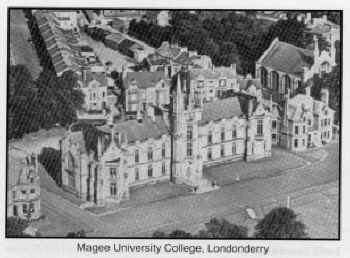 Though I did not know a soul on the train I could hardly believe my good fortune when 1 spoke to one young man and discovered that he was a Magee Student heading back for his second year. Ernest Morrow turned out to be a very good companion for the journey. When we alighted from the train in
Londonderry there were no taxis available at the station. The only form of transport on offer was a donkey. I spoke to its owner and he strapped my two suitcases like panniers over the donkey's back and off we went on foot to my digs in Laurence Hill. When I discovered the distance we had to walk I was glad the donkey was carrying my cases and at journey's end I gladly paid the donkey's owner the half-crown fare.
Though I did not know a soul on the train I could hardly believe my good fortune when 1 spoke to one young man and discovered that he was a Magee Student heading back for his second year. Ernest Morrow turned out to be a very good companion for the journey. When we alighted from the train in
Londonderry there were no taxis available at the station. The only form of transport on offer was a donkey. I spoke to its owner and he strapped my two suitcases like panniers over the donkey's back and off we went on foot to my digs in Laurence Hill. When I discovered the distance we had to walk I was glad the donkey was carrying my cases and at journey's end I gladly paid the donkey's owner the half-crown fare.
Magee proved to be a very happy choice of College and I spent four great years there. Its numbers were small and most of the students were training for the ministry of the Presbyterian Church, though some were heading for the teaching profession and various other disciplines. The College had been founded in 1865 at a time when Presbyterians were debarred from taking a degree at Trinity College, Dublin and so full Arts and Divinity Courses were provided at Magee. In later years Trinity relaxed its ban against Presbyterians and Magee became a constituent
College of Dublin University. This meant students for the ministry could study at Magee, attend for certain terms at Trinity, take their major examinations (here and graduate with Dublin University degrees.
On my first day at Magee I met up with a young fellow student named David Alderdice - a farmer's son from Bessbrook, County Armagh. Like myself David was looking for permanent lodgings so we teamed up together and went in search of a suitable place to stay.
Someone directed us to 5 Ernest Street in the Rosemount area of the city and within easy walking distance of the College. The landlady, Mrs. Violet J Green welcomed us into her home and she agreed to give us a double room and full board for thirty shillings (one pound and fifty pence in present currency) per week. How she managed to provide for us on such a small rental charge I will never know.
Mrs. Greer's husband, Bobby, had died suddenly a short time previously leaving her with two little girls to bring up. She was a great manager and
I often reflect with admiration on the way she brought up her girls so that they became a credit to her. At the same time she was like a mother to both David and myself in the way she saw to all our needs. While some other students chopped
and changed their digs frequently, 5 Ernest Street remained our home for the four years that we were in Londonderry.
David proved to be a congenial good companion throughout the whole of our student days. We roomed together not only in Londonderry but also in Dublin, Edinburgh and Belfast. He was a diligent, hard-working student, a man of strong, deeply committed Christian principles and blessed with an irrepressible and infectious sense of humour. We enjoyed endless fun together. Knowing his rich gifts of mind and heart it has been no surprise to me that he has proved to be one of our most successful and
effective ministers.

When David and Helena were married they asked Kathleen and myself to be their bridesmaid and bestman - symbolic of the bond that had been established between the four of us. That friendship has been maintained throughout the years. Now that we are both retired I am thankful that David and Helena are still among our most hosted friends.
The one great sadness that occurred for me when I was at College, was the death of my mother. It happened in my second year at Magee on
15th January 1948. Mother had gone into Banbridge Hospital for an operation, which the surgeon claimed was very successful, but she took heart failure and died on the operating table. The news of my mother's death was a devastating blow coming so soon after my father's death, less than three years previously on
4th April, 1945, following a prolonged illness. With both parents now dead I felt very vulnerable and alone in the world.
When I returned to Londonderry from my mother's funeral I remember going for a long walk on my own along Strand Road
and asking the inevitable question - "Why? - Why has this happened? What is God trying
to teach me?" As I walked I pondered and I finally came m the conclusion that perhaps God
was showing me how to understand other people's bereavements so that hopefully I would be a more sympathetic and helpful
person when the time would come for me to minister to people faced with tragedy. I drew strength as I
thought of Jeremiah's words, "I sat where they sat "
Fellow students and professors alike were very sympathetic and supportive so that soon I was able to get back to my studies and college activities again.
There was a great family atmosphere in Magee and there was a fine teaching staff. Prof Tom Finnegan, the President, was
a very able Classics scholar and a capable administrator. R.L. Marshall was Professor of English. He was a fountain of knowledge not only of English but also of History, Politics and General Knowledge - and a great storyteller - as was his brother Dr W F Marshall whom we were privileged to have as our teacher of Elocution. Alex Blair says, "His outstanding contribution to the academic world was as a .scholar of the Ulster dialect " For his work in this respect he was elected a Member of the Royal Irish Academy.

On one occasion Dr Marshall took us into Claremont Church and asked us to read aloud a few verses from the Sermon on the
Mount. When each one had finished W F. gave a few words by way of a critique. When my mm came however he asked me to
read the passage again. I was concerned at this for I thought I must have read very badly. Instead he
turned to the class and said, "Listen very carefully for this is a true Ulster voice." When
I had finished he said to me: "Never let anyone persuade you to change your manner
of speaking for yours is an authentic Ulster voice". I hope I have followed his advice.
T H Robinson was Professor of Philosophy and Logic. One of the books we had to study was Bishop Butler's Sermons, a very heavy dull book. My copy had been handed down through several generations of students, so it was very tattered and had long since lost its cover. On the fly-leaf some previous student had written:
'If there .should be another
flood,
For refuge hither fly
For though the world ,should be submerged
This book will still be dry!" |
Professor Robinson had formerly been Minister of Railway Street, Lisburn. It was a strange coincidence that one day I would
follow him as Minister there - but I never tried to preach one of Bishop Butler's sermons!
Prof. Hugh Irvine introduced us to the intricacies of the Hebrew Language with varying degrees of success, When he led us in prayer in the mornings he used extremely long sentences with various subjunctive clauses followed eventually by the verb. We used to listen to hear if the sentence would ultimately make sense, but it always did!
Mathematics and mechanics were taught by Prof W. G. Guthrie, a very gracious, modest, soft-spoken Scotsman. He was also a gifted organist and had a pipe organ installed in his home.
Groups such as the Literary and Debating Society, the Students' Christian Movement and the Evangelical Union, provided opportunities for discussion, expression of views and fellowship, all of which contributed much to our education and training.
I often recall the occasion when the Rev James Kilgore of Claremont Church called to visit David Alderdice and myself. We had a pleasant conversation then be said, "Boys, I want to give you a word of advice - never let your studies interfere with your education! "

Dublin
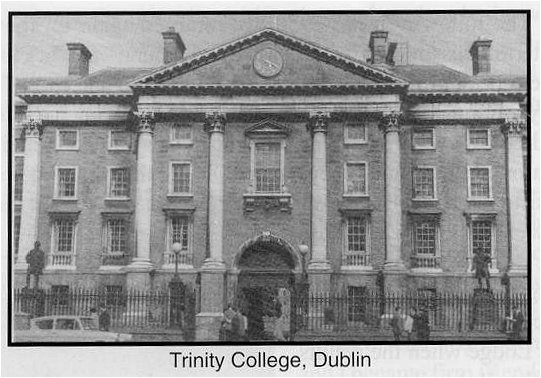 Magee had been a constituent college of Dublin University since 1908 and Magee students made a significant contribution to the life
of that ancient
University
Magee had been a constituent college of Dublin University since 1908 and Magee students made a significant contribution to the life
of that ancient
University
Trinity College, Dublin believed in a broadly based education. At the end of the
second Freshman year all students were required to pass the Little Go' Examination before they could proceed further towards any degree. All Senior Freshman students from Magee came to Dublin for those examinations. That was my first experience of residence in T.C.D. There I stayed in
rooms with Greer Anderson in Botany Bay. The rooms as well as the furnishings were large, ancient and battered looking - and only heated by a coal fire, when someone had time to light it! Magee students generally passed the
'Little Go' Examinations, nobody wanted to have to do 'resits'
I enjoyed my fast visit to Trinity and returned a
few months later to spend the summer term there as a Junior Sophister.
We attended lectures and participated in the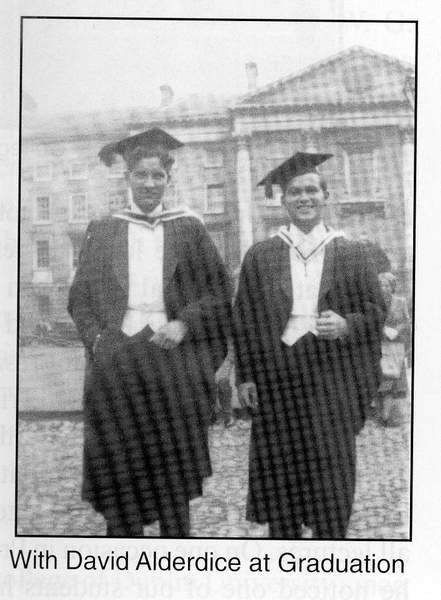 general life of the college. Students were required to wear undergraduate gowns at all lectures. On one occasion in Professor R. R Hartford's lecture he noticed one of our students had come
without a gown. He spoke to him firmly:
"Mr. so-and-so, you are academically naked, please leave the room ", and he did right quickly! Several of us stayed that year in York House near St. Stephen's Green. It was a Salvation Army Hostel and so was quite Spartan but it was conveniently situated. Dublin was a great cosmopolitan city and we enjoyed exploring its streets 'broad and narrow'. Adelaide Road Church had a flourishing Youth Fellowship and we were warmly welcomed into a great social life with the young people. general life of the college. Students were required to wear undergraduate gowns at all lectures. On one occasion in Professor R. R Hartford's lecture he noticed one of our students had come
without a gown. He spoke to him firmly:
"Mr. so-and-so, you are academically naked, please leave the room ", and he did right quickly! Several of us stayed that year in York House near St. Stephen's Green. It was a Salvation Army Hostel and so was quite Spartan but it was conveniently situated. Dublin was a great cosmopolitan city and we enjoyed exploring its streets 'broad and narrow'. Adelaide Road Church had a flourishing Youth Fellowship and we were warmly welcomed into a great social life with the young people.
The following year, 1950, we returned again for the summer term. This time David Alderdice and I found 'digs' at Clontarf, some miles out from the college. We cycled to and from Trinity every day and at
rush hour times we were caught up with literally hundreds of cycles sweeping along in shoals and dodging in and out around buses and other traffic. During that time we worked consistently hard because our degree examinations lay at the end. We were not kept
waiting too long for results. I remember going along nervously to the notice board outside the Porter's Lodge when the results for the B.A. degree were posted up and my delight to see my name written in Latin, as was the custom, Howardus Cromie! When Graduation Day, or Commencements, came along I was pleased that my two sisters, May and Jean and two of my brothers, Robert and Sandy made the journey to Dublin's fair city for the occasion.

Edinburgh
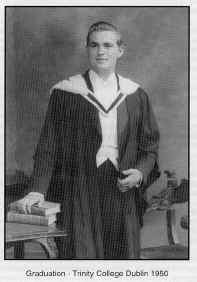 After graduating from Trinity College, Dublin in 1950, I proceeded that autumn to New College, Edinburgh - the Theological Faculty of Edinburgh University. This proved to be one of the most formative experiences of my life.
After graduating from Trinity College, Dublin in 1950, I proceeded that autumn to New College, Edinburgh - the Theological Faculty of Edinburgh University. This proved to be one of the most formative experiences of my life.
New College was in its heyday in the 1950's, enjoying an invaluable international reputation for theological training. The
Recollections of Life and Ministry in the 20th Century Scots were in the minority within the total student body, which had students from every continent and especially from the United States of America. The Second World war had just ended five years previously so there was a great urge among students to travel
and meet up with people from other countries.
During our first year in Edinburgh David and I shared rooms with Stanley Mclvor
from Belfast. Stanley was a diligent, hard-working and highly disciplined student.
He and I became firm friends and that friendship has continued throughout the years. Stanley
became an Army Chaplain and afterwards was appointed Professor of Hebrew and Old
Testament Studies, first in Magee Theological College and then in Union College,
Belfast. Now that we are both retired we often reflect with pleasure on our time spent together at New College.
The Faculty was made up of world famous names such as, John Baillie (Principal), John Burleigh (Ecclesiastical History), Michael Porteous (Old Testament), William Manson (New Testament), James S Stewart (New Testament and Homiletics), Tom Torrance who began in 1950 as Professor of Church History and later succeeded John Baillie in Divinity. They were all men of intellectually stimulating scholarship and of profoundly devotional spirit. Tom Torrance gave me a love of Church
History which has remained with me ever since and which gave a new dimension to my thinking. I was glad I majored in Church History for my B.D. degree in Edinburgh. James S Stewart's style of preaching has remained a constant source of inspiration to me throughout my ministry. He was one of the humblest and one of the most devoutly spiritual men I have ever known. When I was nominated as Moderator of the General Assembly I received a most gracious letter from him assuring me of his prayers. That I appreciated greatly. Then about three days before the opening of the General Assembly I had a further letter saying he knew my installation was at hand and he wished to reassure me that he was praying for me every day.
Edinburgh gave me my first experience of pastoral work. I spent two years as Assistant to the Rev Joseph Gray,
T.D.,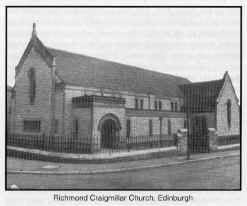 M.A., in Richmond Craigmillar Church of Scotland. The Church and Halls on Niddrie Mains Road formed a lovely suite of buildings serving a large housing estate, but sadly only a very small percentage of the people ever came to church. This was my first head-on encounter with the unchurched masses, though we had some success with individuals and families who became involved in Sunday School and Youth Organisations. Peter Anderson, Captain of the B.B. Company, was a great character who related well to the boys. He appointed me as Assistant Chaplain to the Company and I have been involved with Boys' Brigade ever since. M.A., in Richmond Craigmillar Church of Scotland. The Church and Halls on Niddrie Mains Road formed a lovely suite of buildings serving a large housing estate, but sadly only a very small percentage of the people ever came to church. This was my first head-on encounter with the unchurched masses, though we had some success with individuals and families who became involved in Sunday School and Youth Organisations. Peter Anderson, Captain of the B.B. Company, was a great character who related well to the boys. He appointed me as Assistant Chaplain to the Company and I have been involved with Boys' Brigade ever since.
Twenty years later, in 1971,I had the privilege of being guest preacher at a special service in the Usher Hall for the Edinburgh Battalion of the Boys' Brigade and attended by the Lord Provost and Corporation of the City, It was an inspiring experience to see that vast auditorium packed with vibrant young boys and their officers.

The Rev Joseph Gray had been a Chaplain in both World Wars and liked things done in a strictly regimental style. This
was something quite new to me, but I decided to meet him as far as possible and I freely acknowledge it did me good. St Paul would have agreed that 'all things should be done decently and in order'. My Gray and I became
firm friends and when he retired it was my pleasure to visit him in the Church of Scotland home for retired ministers.
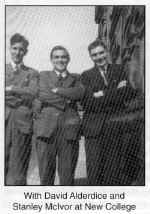 When we completed our examinations in May 1951 David Alderdice and 1 took the overnight bus from Edinburgh to London - a long tiring journey in the days before the motorways were built. We arrived in London at 8.00am and then set out on foot to see as many of the principal buildings and places of interest as we could pack in - from St. Paul's to Hyde Park, White Hall, Buckingham Palace, etc. After lunch at Lyons' Salad Bowl we took a bus to Battersea Gardens where the 1951 Festival of
Britain was being held. This was a tremendous experience and we didn't see the time flying. Eventually we had to leave the Exhibition, so we joined a bus queue along with hundreds of others. Some young people were behind us so I asked them where the bus was going. They said,
"Trafalgar Square ", to which I replied, "That's fine". Then they asked,
"Where are you staying?" but I could only say we hoped to find somewhere in the centre of London. They were highly amused at this and asked us if we had ever been in London before, and the answer was 'No'. Then they said,
"You are Crazy, you will never find anywhere at this time of night. " After a muttered conference among themselves, one of them asked if we would like to spend the night with them, and we readily agreed. They turned out to be a group of students from Stoke-on-Trent and they were staying in the Kensington Hotel. Eventually we arrived at the Hotel and approached the Receptionist to ask if we could have accommodation. She looked at David and myself and said,
"I know you two, you had lunch today at Lyons' Salad Bowl and I was sitting at the next table to you
". Fortunately we must have behaved ourselves because she gave us accommodation for the night without any hesitation. It is a small world! The next day we completed our sightseeing in London and boarded the overnight bus for the return journey to Edinburgh.
When we completed our examinations in May 1951 David Alderdice and 1 took the overnight bus from Edinburgh to London - a long tiring journey in the days before the motorways were built. We arrived in London at 8.00am and then set out on foot to see as many of the principal buildings and places of interest as we could pack in - from St. Paul's to Hyde Park, White Hall, Buckingham Palace, etc. After lunch at Lyons' Salad Bowl we took a bus to Battersea Gardens where the 1951 Festival of
Britain was being held. This was a tremendous experience and we didn't see the time flying. Eventually we had to leave the Exhibition, so we joined a bus queue along with hundreds of others. Some young people were behind us so I asked them where the bus was going. They said,
"Trafalgar Square ", to which I replied, "That's fine". Then they asked,
"Where are you staying?" but I could only say we hoped to find somewhere in the centre of London. They were highly amused at this and asked us if we had ever been in London before, and the answer was 'No'. Then they said,
"You are Crazy, you will never find anywhere at this time of night. " After a muttered conference among themselves, one of them asked if we would like to spend the night with them, and we readily agreed. They turned out to be a group of students from Stoke-on-Trent and they were staying in the Kensington Hotel. Eventually we arrived at the Hotel and approached the Receptionist to ask if we could have accommodation. She looked at David and myself and said,
"I know you two, you had lunch today at Lyons' Salad Bowl and I was sitting at the next table to you
". Fortunately we must have behaved ourselves because she gave us accommodation for the night without any hesitation. It is a small world! The next day we completed our sightseeing in London and boarded the overnight bus for the return journey to Edinburgh.
One date I shall not forget is 31st January 1953. It was a Saturday and
I went out for a walk in the afternoon. I climbed to the top of Calton Hill but was nearly blown off my feet with the gale-force winds that were howling angrily. With difficulty I made my way down again and returned to my
'digs' in 28 Windsor Street. There I was told that the Princess Victoria, the cross-channel ferry, was in difficulties in the Irish Sea. At first it seemed unthinkable that such a large and apparently stable boat could come to any ultimate harm.
However, as the afternoon wore on the radio reports became more alarming as we
learned that the car deck doors were open, she was listing and taking in water. Eventually the sad news came that having drifted seriously off course the ferry had sunk near the Copeland Islands. The loss of life was horrendous. Two well-known M.Ps, Sir Walter Smiles and Maynard Sinclair lost their lives within sight of their homes at Donaghadee. In all some 128 passengers and crew were drowned.
It was the worst sea disaster since the War and it plunged the whole country into a deep sense of shock and sorrow.

Belfast
The Presbyterian Church in Ireland required all students for its Ministry to take the
final theological year in The Presbyterian College, Belfast, now known as Union College. This was a good experience for it brought together students who had attended a variety of Universities and Seminaries in other countries. It also gave us an insight into the College of our own Church.
Ernest Davey, the Principal, was widely respected as a scholar and a man of deep sincerity of spirit. Sadly the Heresy Trial to which he was subjected in 1927 left its mark on him, even though he was vindicated by the General Assembly and in 1953 was elected as its Moderator.
Robert John Wilson occupied the Chair of Old Testament, Scott Pearson, Church History and James L M Haire Systematic Theology. Jimmy
Haire was the youngest member of the Faculty and his Barthian theology appealed to most students who had studied outside of Ireland. He became a very good friend of mine ever after.
I enjoyed that year at Assembly's College, as it was commonly called, and was pleased to become a Getty Prizeman and also to be awarded the Smiley Gold Medal for Oratory.
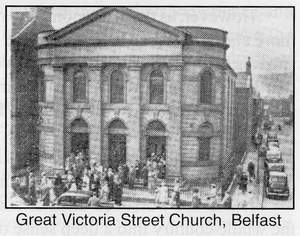 During that year I also served as Student Assistant in Great Victoria Street under the ministry of the Rev James R Boyd whom I had first met as Organising Secretary for S.C.M. in schools. J.R.B. was a very well organised,
disciplined parish minister. From him I learned much about home and hospital visitation and pastoral care for people in need. Some years later
he became Professor of Practical Training in Union College. He was a most gracious Christian gentleman and his
wife, Mary, an equally gracious Christian lady. It was my good fortune to have them as my friends ever after. The
Deaconess at the time was Miss Dorothy Shannon who later gave outstanding service as a Missionary in India. During that year I also served as Student Assistant in Great Victoria Street under the ministry of the Rev James R Boyd whom I had first met as Organising Secretary for S.C.M. in schools. J.R.B. was a very well organised,
disciplined parish minister. From him I learned much about home and hospital visitation and pastoral care for people in need. Some years later
he became Professor of Practical Training in Union College. He was a most gracious Christian gentleman and his
wife, Mary, an equally gracious Christian lady. It was my good fortune to have them as my friends ever after. The
Deaconess at the time was Miss Dorothy Shannon who later gave outstanding service as a Missionary in India.
On completion of my studies the Presbytery of Banbridge, licensed me as a Probationer for the ministry on 2nd June 1952, in my home church, Scarva
Street.

Holiday in France
Having completed our studies and been licensed for the Ministry, my friend David Alderdice and I decided to go for a holiday to France. This was a completely new experience; neither of us had been out of the British Isles before.
In preparation for the journey we went to Smithfield Market, a famous place in those days for buying all kinds of second-hand commodities. There we bought a motorcycle, a small Royal Enfield, 125 two stroke machine for �25.00, and wheeled it round to Queen Street Police Station where David's brother Tommy was a Police Sergeant and
there we stored it. We had never ridden a motorbike before so the next day I rode it to Banbridge and back for experience!
The following evening, 30th June 1952, we set off with our little Royal Enfield and all our worldly goods for the journey packed into two small ex-army knapsacks tied on either side of
the back wheel. Never did two tourists travel so lightly. We took the night crossing to Liverpool and disembarked there in the early hours of the morning. The rain was pelting down, the bike would not start and we were cold, not a great beginning! However, eventually we got underway, crossing the Mersey we headed straight for London. Stanley Mclvor had given us the address of his sister Mrs. Gertrude Barnhard who lived on the South Side. We drove right through the centre of London and apart from the engine stalling when we stopped at traffic lights in Piccadilly Circus and horns started hooting at us, we made our way right to Stanley's sister's house. There we were given a bed for the night, a good breakfast next
morning and sent on our way rejoicing.
From Dover we crossed to Calais arriving in the early morning. Being very inexperienced motor cyclists we decided to avoid the main autobahn but soon found the secondary roads were rough and poor Eventually we came to a small town about 7.00am, but there were no people about apart from one man who was taking the shutters down from his Cafe windows. We asked if we could have some coffee and rolls. While we were having breakfast our friend asked us where we were going. We blandly replied,
"to the Riviera ". He looked through the window at our little Royal Enfield parked by the footpath and he said,
"Are you both riding on that? Do you realize how far it is to the Mediterranean? You will never get there on that thing. You are mad!" We didn't disagree; nevertheless we assured him we were determined to try. He wished us well as he waved us goodbye, but I shudder to think what he was saying under his breath!

French Reformed Church in Chateau Terry
The journey down through France was great fun. We enjoyed seeing farmers working in
t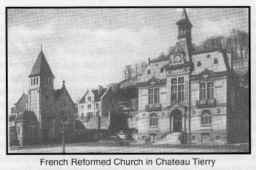 heir
fields who often greeted us as we sped along. The further south we went the hotter the sun became. Soon we were well sun-tanned and with wearing shorts our legs became quite sunburnt but some sun cream soon took care of that. All along the way there were lots of vineyards and all kinds of fruit trees, some overhanging the footpaths so that we had no shortage of plums, pears, apples, etc. and in the villages there were always little cafes where we ate. heir
fields who often greeted us as we sped along. The further south we went the hotter the sun became. Soon we were well sun-tanned and with wearing shorts our legs became quite sunburnt but some sun cream soon took care of that. All along the way there were lots of vineyards and all kinds of fruit trees, some overhanging the footpaths so that we had no shortage of plums, pears, apples, etc. and in the villages there were always little cafes where we ate.
Usually we found a barn or disused house where we slept or at least sheltered for the night. On one occasion we approached a well-kept town, which we found was called Chateau Tierry. I suggested to David that we should find out if there was a French Reformed Church in it and before long we found a lovely Church which had been built by the Americans during the War and given to the Reformed Church. There we were welcomed by the Pastor and his family who not only allowed us to sleep in the Church Hall but who also entertained us to a delightful meal and then took us out to see the sights of the town. Our `French'
was very limited and so was their `English', yet we managed to communicate remarkably well. Our faith was our common bond and they certainly gave us a time example of the grace of hospitality.
On the Saturday night we reached the city of Grenoble. It was a lovely balmy warm evening and as we rode along we saw a field with stacks of hay so we rearranged one of the stacks and made a bed for ourselves. There was not a cloud in the sky and there we lay under tire starry heavens. It was a delightful scene. Though I remember thinking if anything happened to us here, not a soul at home knew where we were. As we lay there I was reminded of
the words of the Psalmist:
"When I consider Thy heavens,
The work of Thy fingers,
The moon and the stars which Thou halt ordained.
What is man that Thou art mindful of him
Or the ,son of man that Thou visitest him?"
|
After Grenoble we rode through the Alps along by narrow winding roads with steep cliffs on one side and sheer precipices going down hundreds of feet into deep ravines on the other and often with no protecting wall or fence. Meeting buses and cars was a nightmare. If we had no experience of motor cycling before we left home, we had plenty by the time we got through the Alps! I have no doubt in retrospect that only the Grace of God saw us safely through.
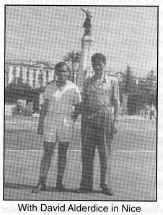 Over the Alps we got the first sight of the blue Mediterranean. We shall never forget that panoramic view bathed in bright sunshine. From there it was an easy ride to the beautiful seaside resort of Nice. There we found a lovely little family-run hotel in which to stay. Hot water and baths were a welcome change from washing in cold rivers and streams. Nice had been a popular
centre for English holidaymakers in Victorian times and one of the loveliest sea front areas is known as La Place d' Anglaise.
Over the Alps we got the first sight of the blue Mediterranean. We shall never forget that panoramic view bathed in bright sunshine. From there it was an easy ride to the beautiful seaside resort of Nice. There we found a lovely little family-run hotel in which to stay. Hot water and baths were a welcome change from washing in cold rivers and streams. Nice had been a popular
centre for English holidaymakers in Victorian times and one of the loveliest sea front areas is known as La Place d' Anglaise.
It made an excellent base for us from which we were able to explore the coastal scenery including Monte Carlo where we rode around the Rally Course on our Royal Enfield! We also visited Cannes, another lovely holiday resort, and Marseilles with its magnificent harbour. Before we left the Riviera we bought a few keepsakes including colourful ties for ourselves and pearl brooches of Cote d'Azure for Kathleen and Helena.
Leaving the Mediterranean behind and heading north again we visited the town of Avignon and saw the high stone walls of the castle where the Popes had lived during the
'Babylonian Captivity of the Papacy', bringing our Church History back to us. As we approached the city of Lyons the rain came on and as we came up the hill the chain of our motorbike broke. Try as we might we were unable to fix it and to make matters worse it was past closing time. I saw some men standing at an entry and I explained our problem to them as best I could.

However they just shrugged their shoulders and said they could not help us. Then one of them said,
"You English? " I replied, "No, we Irish ". Whereupon their faces lit up. We were not English, we were Irish. Their attitude changed immediately. They offered to get someone to fix the chain, they told us where to get food and persuaded us to stay the night in a loft above a garage. When we thanked them for their kindness one of them said,
"You Irish, you no like the English. We no like the English either!" That night David slept in the cab of a lorry while I lay in the loft. About 2 o'clock in the morning David shook me and said, "Are you all right?" I assured him I was and asked him why he was worried. He said he had heard groanings and thought I was being murdered! We listened for a while and discovered there was an old man
'sleeping rough' in the garage and it was his snoring that David had heard. Next morning with our bike repaired, we were on our way again.
Paris became our next objective. We must have looked a rare sight riding up the Champs Elysees, but we were not concerned. The Rev Joseph Gray with whom
I had worked in Edinburgh had given me the address of the Rev Dr Donard Caskie, Minister of the Scots Church in Paris. He had been famous during the War as the Tartan Pimpernel, working with the French Underground Movement, and had been responsible for the escape of dozens of British Servicemen back to Britain. Donald was a bachelor who kept 'open house' for all kinds of passers by. On the mention of Joseph Gray's name he welcomed us warmly and gave us a bed for the night, along with several others who dropped in as we did. That evening we visited as many of the historic sights as we could including the Eiffel Tower, Notre Dame Cathedral, L'Arc de Triomphe with the tomb of the unknown soldier and finished the evening with a visit to the Folie
Berg�re as a sample of `Gay Paris'. Next morning we had the pleasure of worshipping in the Scots Church where the service was conducted by the Tartan Pimpernel himself.
The 13th July is the eve of Bastille Day, so all flags were flying as we left Paris and headed for the coast. That night we stayed in a hay barn. We used bales of hay to build a kind of room
for our bike and ourselves. There we slept contentedly until we were wakened about 6.00am by men's voices and the sound of horses being harnessed for the day's work. We lay quietly so they never discovered they had uninvited guests in their midst! After the farmers and their horses had gone we dusted ourselves down, tidied up the bales of hay, mounted our bike and were on our way. It was the
14th July; the French National Holiday and we enjoyed riding through villages decorated with red, white and blue bunting and French Tricolours on our way to Boulogne where we boarded the ferry to Folkstone.
In spite of what the cafe owner had said to us on our first morning in France - mad or not -we had made it to the Riviera and back again. Our return trip through England went without a hitch, the weather was noticeably cooler so we did not attempt to sleep under the stars, and instead we got good bed and breakfast accommodation. Our final night was in the lovely old city of Chester. Next morning we visited the Cathedral. The first thing
I saw in it was a mural of Elijah being fed by the ravens and under it the text,
"Arise and eat for the journey is too great for thee! "
That night we returned by the Liverpool boat to Belfast where Kathleen and Helena gave us a great welcome home. The Royal Enfield had `done us proud'. Yet when I offered to take Kathleen home on the pillion the engine refused to start, so I had to take her home by taxi - what a humiliation!
Strict currency regulations were in force at the time, so that officially we had only been allowed to take �10.00 each out of the country, yet the amazing thing was that when we came home
I still had the price of the taxi fare!

St Enoch's
St Enoch's Church in North Belfast, was the scene of my final Assistantship. This was a most enriching experience `working
with the minister the Rev Dr Austin A Fulton and the Deaconess Miss Jessie Kerr.
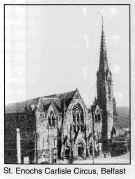 Dr. Fulton was an outstanding preacher and recognized as one of the ablest ministers in the Church. He was not only a noted Theologian and exponent of Karl Barth but also a man of wide experience, having worked as a Missionary in Manchuria until war broke out with Japan. He escaped to Canada and ministered there until the war ended. Soon afterwards he was called to be Minister of St. Enoch's.
Dr. Fulton was an outstanding preacher and recognized as one of the ablest ministers in the Church. He was not only a noted Theologian and exponent of Karl Barth but also a man of wide experience, having worked as a Missionary in Manchuria until war broke out with Japan. He escaped to Canada and ministered there until the war ended. Soon afterwards he was called to be Minister of St. Enoch's.
In those days St. Enoch's was one of the largest and most prestigious churches in Belfast. Dr. Fulton gave me responsibility for the Sunday afternoon Bible Class. About 200 young people attended regularly. They were a lively,
sharp-witted lot who kept me on my toes and I thoroughly enjoyed working with them.
The Sunday Services were an inspiration in which to be involved. Dr Fulton was often in demand as a guest speaker in other churches and so I gained experience from regular preaching. The congregation was also most appreciative and encouraging. I am forever indebted to my time in St. Enoch's.
'Dr and Mrs. Fulton continued to be our close and trusted friends for as long as both of them lived and they were always welcome in our home.
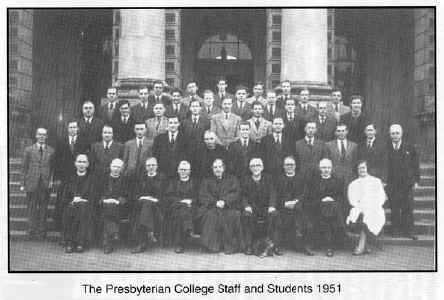

ENNISKILLEN
In May 1954 1 received a unanimous call to the Presbyterian Congregation in Enniskillen, locally known as the Scots Church and was ordained there on 21"July 1954. That was a momentous occasion. It began with a luncheon in the Imperial Hotel at 12 noon followed by the service in the Church at 2.OOpm led by the Presbytery of Clogher. I shall never forget the sense of awe that filled me as I knelt and the hands of the Presbytery were laid on my head. Now I was ordained to my life's work in the service of Christ as a Presbyterian Minister. It was an Ordination Service that was charged with a great sense of uplift, strength and encouragement - surrounded as I was by a host of family and friends. A busload had travelled all the way from St. Enoch's to see me duly ordained and installed.
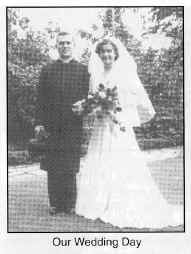 Little more than a month later, on the 31stAugust I was united in marriage to my life's partner, Miss Kathleen Moors, in our home Church, Scarva Street, Bainbridge. Kathleen's sister Hope, was her Bridesmaid, while the Rev Harold Gray, a colleague and former member of St. Enoch's, was my Best Man. (Harold continued to be a close friend of mine in the ministry and eventually became my neighbour as Minister of Harmony Hill, Lambeg). My father-in-law, the Rev William Moors, performed the marriage ceremony assisted by the Rev Dr Austin Fulton.
Little more than a month later, on the 31stAugust I was united in marriage to my life's partner, Miss Kathleen Moors, in our home Church, Scarva Street, Bainbridge. Kathleen's sister Hope, was her Bridesmaid, while the Rev Harold Gray, a colleague and former member of St. Enoch's, was my Best Man. (Harold continued to be a close friend of mine in the ministry and eventually became my neighbour as Minister of Harmony Hill, Lambeg). My father-in-law, the Rev William Moors, performed the marriage ceremony assisted by the Rev Dr Austin Fulton.
Knowing the uncertainties of the weather in Ireland, we took a risk in holding the reception in a marquee on the tennis court at the Manse. The risk paid off, however, and we enjoyed a sunny afternoon meeting and mingling with our guests on the lawn. After our honeymoon, which was spent in Torquay and London, Kathleen and I returned to Enniskillen and set up home together in a little bungalow on the Sligo Road because the Senior Minister, the Rev Arthur J Jerkins, still occupied the Manse. Two and a half years later we moved to the magnificent Manse on Chanter Hill Road, after the death of
Mr. Jenkins.
The first Christmas of our married life is one we will never forget. Some people told us not to buy a turkey because
Mr. James McCartney of the Scotch Store always gave one as a gift to the Minister. However we had no reason to expect the same generosity would be extended to us as newcomers, but it was. On Christmas Eve the gifted turkey arrived complete with stuffing fortunately, because Kathleen had hurt her back rather badly and the Doctor had ordered complete bed-rest.
I had never cooked a dinner; much less a turkey dinner before and to my horror I found that Kathleen, who was skilled in other culinary arts, had never cooked a turkey either! However with the help of a dependable cookery book and instructions from the bedroom I managed to cook the turkey!
I had three firsts in one day. I cooked a Christmas Dinner, I conducted a Christmas Service and I nursed a wife who could hardly move - and survived to tell the tale.
After the meal I went into the kitchen and surveyed the wreckage of the turkey and all the dirty dishes - no dishwasher in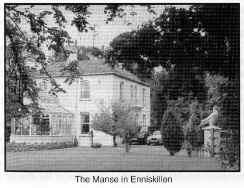 those days. I was wondering how to tackle the debris when the doorbell rang. On answering it I found two angels on the doorstep in the form of Mrs. Maude Hanna and Mrs. Hugh Menown who announced bravely,
"We've come to wash the dishes!" They will never know how glad I was to see them. those days. I was wondering how to tackle the debris when the doorbell rang. On answering it I found two angels on the doorstep in the form of Mrs. Maude Hanna and Mrs. Hugh Menown who announced bravely,
"We've come to wash the dishes!" They will never know how glad I was to see them.
Enniskillen proved to be a wonderful place in which to begin one's ministry. I often look back on it as a great training ground. The Proprietor and Editor of the Impartial Reporter, Mr
Wm. Egbert Trimble was a member of the congregation and a regular attender at church. He took delight in
`having a go' at local personalities in his paper - which at times was not altogether 'impartial', and some people were terrified of him.

For this reason I learned from the start the importance of thorough preparation, checking my sources and my facts rather than making careless or unguarded statements, otherwise I might have suffered from it in the local press.
This proved to be a good discipline. A mutual respect developed between Bertie Trimble and myself so that he proved to be a very good friend and supporter of mine. He and his wife, Marie, were very musical and their two daughters, Joan and Valerie Trimble became world famous pianists. We often enjoyed hospitality in the Trimble home at
'The Battery'.
There were just three elders in the Kirk Session when I came. Mr John J Sloan, Mr Robert Dickie and Mr Isaac Parker, Clerk of Session. They were all leading businessmen in the town and all with a great love for their church. Being just the four of us our meetings were often held in the little office at the rear of Mr.
Sloan's shop and we were always served with a welcome cup of tea by one of Mr Sloan's staff. The wisdom, good humour and kindness of those elders was a great source of encouragement and help to me.
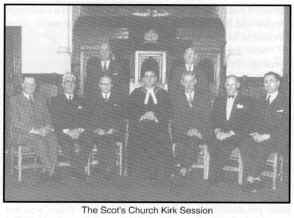 In time we had an election of Elders which greatly increased the size of the Session and expanded its effectiveness in the congregation which was very necessary, but never again was there the same informal intimacy as when there were only
`Peter, James and John!' or rather should I say, 'Isaac, Robert and John!'
In time we had an election of Elders which greatly increased the size of the Session and expanded its effectiveness in the congregation which was very necessary, but never again was there the same informal intimacy as when there were only
`Peter, James and John!' or rather should I say, 'Isaac, Robert and John!'
Pastoral visitation was a very enjoyable experience and an essential part of my ministry. I can think of no better way of getting to know the members of a congregation even though it is very time consuming.
The members of the Scots Church were well blessed with the `Grace of Hospitality' and we often reflect with pleasure on some wonderful evenings spent in their homes. Soon after we arrived Mr and Mrs. D F Clarke invited us to dinner, which
turned out to be a feast. We had a delightful evening with them and their young family. Eventually about 11 o'clock we suggested it was time for us to go home whereupon Mrs. Clarke said,
"You are in Fermanagh now and no one leaves before midnight, besides you haven't had your supper yet
". Accordingly we settled back to enjoy the evening, though wondering where we would put supper! That was the beginning of a great friendship in which we have shared their joys and sorrows throughout the years since then. Sadly
'D.F' and his son George are no longer with us.
The fast baby that I ever baptised was Sandra Sloan, the only daughter of Captain and Mrs. C.G. Sloan. This brought me into close contact with the Sloan family. Cecil and Heather were great fun and through our friendship they became very actively involved in the life of the Church. In time Sandra invited me back to officiate at her wedding, which I gladly did. Some years
later however, when she was a very young mother, I had the sad task of taking part in her funeral. Only the Grace of God can bring families through such experiences as stronger and better people. Cecil and Heather have always provided us with a home-from-home on our return visits to Enniskillen though sadly Cecil has since gone to his heavenly home.
In Enniskillen we enjoyed a wide circle of friends. As the writer to the Hebrews would say,
"Time would fail me to speak of"; James and Nancy Morell, Harry and Maureen West, the Craig family, Gordon and Hazel Parker, the Dickey family, Billy and Nessie Mullan, Mrs Leinster, Mrs Hanna, tire Alexander family, Gordon and Joan Wilson, the Whaley family, Edgar and Joan Allen, Billy and Dorothy Chambers, James and Ada Malone and a host of others.
Portora Royal School attracted a large number of boarders in those days of which a sizeable proportion were Presbyterians. They attended our Sunday School and Church during term time and many of them retained an affection for the Scots Church in later life.

Another addition to our morning services was the attendance of the Royal Ulster Constabulary Recruits from the Police Training Depot. Since many of them came from Down and Antrim they were mainly Presbyterians as were their Instructors. It formed an interesting and colourful sight to see them marching on parade to church and then to see them forming up after the Service to march back to the Depot. For many years afterwards wherever I went throughout the Province the policemen whom I met recognised
me and recalled the happy days when they attended my Church.
Enniskillen was the County Town of Fermanagh so the Assizes were held in the Courthouse on the opposite side of the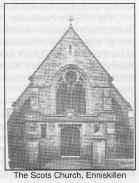 street from The Scots Church. The Lord Chief Justice during my
time was Lord MacDermot of Belmont. He and his circuit judges and bodyguards stayed at Killyhevlin Guest House for the weekend and always attended our Church on the Sunday. Their presence always created quite a stir! Lord MacDermot, who was a close friend of Kathleen's family, came on occasions to have lunch with us after the service. He was a very sincere, Christian man and on one occasion we were talking about worship and sermons. I asked him what he looked for when he came to church. He said that when he sat on the bench all week and listened to cases in which witnesses did not appear to know the meaning of truth, he came to church on Sunday to be reminded of the Great Certainties of Christian Belief. street from The Scots Church. The Lord Chief Justice during my
time was Lord MacDermot of Belmont. He and his circuit judges and bodyguards stayed at Killyhevlin Guest House for the weekend and always attended our Church on the Sunday. Their presence always created quite a stir! Lord MacDermot, who was a close friend of Kathleen's family, came on occasions to have lunch with us after the service. He was a very sincere, Christian man and on one occasion we were talking about worship and sermons. I asked him what he looked for when he came to church. He said that when he sat on the bench all week and listened to cases in which witnesses did not appear to know the meaning of truth, he came to church on Sunday to be reminded of the Great Certainties of Christian Belief.
The town was growing throughout the fifties and so was the Congregation. Most of the leading business people were
Presbyterians as were many of the staff in the various Government Offices, schoolteachers and other professional people. With just
one Presbyterian Church in the County Town I found myself leading a very busy life representing the Church
in a wide range of community affairs. I was a member of several school committees
including the Board of Portora Royal School. I became a member and later vice-chairman of Fermanagh
Hospital Management Committee. I was Chaplain to the Royal Ulster Constabulary Training Depot. These
and many other contacts with community bodies were of great value to my ministry and to the Church.
The only Churches that existed in Enniskillen in those days were the Church of Ireland, The Methodist Church, the Presbyterian Church, the Roman Catholic Church and the Salvation Amy. Relations between these churches were very harmonious. For several years I conducted 'Out Post' services in the Methodist Church in Derrygonnelly on Sunday afternoons and also in the Parish Church of Inishmacsaint for members of the R.U.C. Reserve who were based in that area during the 1956-60 Troubles. When a vacancy occurred in Lisbellaw I agreed to become the stated supply for a period-which continued throughout the remainder of my time in Enniskillen.

The Christian Endeavour Movement was strong in County Fermanagh. It was a fine organisation especially for young people, helping them to develop in the Christian life. I was President of the Enniskillen and Sligo C.E. Union for a time as well as serving on the Irish Council for a number of years.
The Clogher Presbytery stretched from Aughnacloy to Enniskillen, a distance of some fifty miles. To overcome the problem of some of our Ministers feeling isolated, a few of us decided to form the Clogher Clerical Club which met each month rotating round the Manses of the Presbytery. This provided a great enrichment to the sense of fellowship both for the Ministers and their wives.
Each summer we had an outing, usually to some seaside resort. One particular year we decided to go to
Rosses Point - a beauty spot on the coast of County Sligo. We set out from our Manse in Enniskillen with several cars. However we had only gone a very short distance when my car broke down. Fortunately it happened near
the house of one of my elders, Capt.T.G. Whaley, so I sought his help. Tom very kindly insisted that I borrow his
car for the day. I accepted and we soon made the transfer of my passengers. It was a lovely day and we enjoyed our journey to
Rosses Point where we met up with the rest of our party for a picnic lunch. In the afternoon some of the ladies expressed a wish to go into Sligo town to do some shopping. l offered to take them and all went well until we were returning to
Rosses Point in the late afternoon. Suddenly a cow bolted out of a laneway and crashed into our car damaging the wing and its head going through the windsceen. Eventually the farmer appeared with
the rest of his cows, but he had little to say. We decided we had better report this accident to the local Garda, whom we had difficulty locating. When eventually we found him he asked,
"Is anybody killed? " We said "No ". "Is anybody hurt? "
We said "No ". Then said he "I'm not interested ". And he refused to come out to visit the scene of the accident.
That evening we had a cold journey home with no windscreen but I was more concerned about having to report the accident to Tom Whaley. To his credit, however, he was most understanding and told me not to worry, the insurance would cover the cost of the repairs. In a few days the car was restored and all was well until I received a solicitor's letter from the farmer claiming for damages to his cow! I took the letter to my solicitor, Mr. Rainey Hanna, who said he would look after it for me. Some time passed and eventually notice was served on me to appear at court in Sligo. Because of the Border, Rainey Hanna was not authorised to represent me in a court in the Irish Republic but he assured me he would engage a good Sligo firm to handle the case. On the appointed morning we all set out for Sligo. Rainey brought me straight to the office of the Sligo lawyer. I could not believe my eyes when I saw the name on the brass plate
'ARGUE AND PHIBBS-SOLICITORS'! How could l lose a case with such a firm representing me? Mr Brown a member of that
famous legal firm took a few casual notes and then said be would see me in court.
Our case was due to be heard at 11.OOam but the previous hearing dragged on until twelve o'clock. Once the Angelus tolled the Judge suspended proceedings for five minutes while most people gave the sign of the Cross and bowed their heads in prayer, after which the business of the court resumed.
This was my first appearance in court, so when the case was called Rainey Hanna whispered to me not to be alarmed if I did not recognise the case as it would be presented by the opposition. How right he was! The farmer claimed that he came out of the lane ahead of his cattle and signalled me to stop but that I was coming so fast
I could not stop and drove straight into his cow. After the cross-questioning of witnesses and so forth the Judge eventually made his pronouncement.
"It appears to me that the plaintiff has described this accident, not as it happened but as he would have liked it to happen. Case dismissed. " We were a happy group as we came out of Sligo Court that day and headed to the Great Southern Hotel for a late but very good lunch.
One special trophy of Grace was Sidney, the Manager of the local cinema, one of the kindest and most generous men one could ever meet. Sadly, however, he had become a serious alcoholic and this was ruining his life. Though he was devoted to his very patient wife and lovely little daughter, he completely lost all sense of reason once he came under the influence of drink.

Fortunately he related well to me when I tried to help him. So for weeks and weeks I met with him, talked to him and prayed with him. Part of the problem was
that he had too much free time during the day and there was a bar across the street from the cinema, so I had to find him jobs to do during the day to keep him occupied. He was fond of painting so he painted the garage at the Manse. Then he painted the heating pipes in the Church. One day
he came to me in great distress because he had spilled a full tin of paint on the floor of the Church! We got it cleaned and I told him not to worry, but the mark of the paint remained.
On one occasion a midnight matinee was being shown in the cinema for charity. This had always involved drink at a reception afterwards. Sidney expressed his concern that he would not be able to resist the temptation on that night, so I said I would put on a collar and tie and attend as someone from head office to give him moral support. Sidney would not agree to me coming, but when he saw how determined I was to keep him sober he asked God to give him strength to resist the temptation, and He did.
Sidney gained the victory through the power of God. I encouraged him to join Alcoholics Anonymous and from then on he became a new man. His home life was blessed and his example became an encouragement to many. On his last visit to Enniskillen he told me he went back to the Church to see if the paint mark was still on the floor, but he couldn't find it! - A parable! Last year Sidney's daughter rang to tell me her father had gone to Glory and his last request was that I should conduct his funeral, which I did, giving thanks to God for this
'Trophy of Grace'.
It was while we were in Enniskillen that our two sons were born, Alan on 12th March 1956, and David on 22nd October 1958. They brought great joy not only to their parents but also to the Congregation and to one member in particular, Mrs. Maude Hanna who had a newsagency and confectionery shop in the High Street. She said she had a great love for
`Cubs' (boys) but no time for 'Cuties' (girls)! So she claimed the right to be
Chief Baby Sitter and became a greatly beloved `Auntie Hanna'.
Enniskillen was so far from Belfast that in some respects it had more of an affinity with Cavan, Leitrim and Donegal.
Bundoran and Rosnowlagh would have been its nearest and most popular seaside resorts and indeed during the summer months there was a general exodus to caravans and houses in Rosnowlagh. It was natural, therefore, that Enniskillen was a community with a culture and character that was all its own.
Fermanagh people were very warm-hearted and they responded well to the ministry that I sought to exercise among them. The message of the saving love of God in Jesus Christ never failed to touch their hearts and it was my joy to see that congregation built up in faith and love. Five of our members entered the full-time service of the Church. Bill McIlfatrick became a Minister, Margaret Leinster; a Missionary, Sarah Swindel; a Deaconess, Wilson Thorpe; an Irish Mission Colporteur and Charles McClure; a Kinghan Mission Worker.
On the first Sunday in November 1961 there was an uneasiness among the congregation when they discovered in
their midst 12 'spies' as they called them, from the vacant congregation of Railway Street, Lisburn. The deputation had decided to slip in quietly to the back of the church just before the service was about to begin so that they would not be noticed. To their great embarrassment however, they discovered when they entered that the church was full and they had to sit on chairs right up the aisle - there was no hiding place! Subsequently the Lisburn congregation made a unanimous
call to me. This came as sad news to the people of Enniskillen for a strong bond of love and trust had developed between both Minister and people. Preparing to leave was not easy, but I believed it was a call from God that must be obeyed.
On Sunday night 31st December 1961, I preached my farewell sermon to a packed congregation. My text was from the
40th Psalm. verses 7-9 - 'In the volume of the book it is written of me,
I delight to do Thy Will O my God; yea Thy Law is within my heart. I have preached righteousness in the great congregation. Lo, I have not refrained my lips, 0 Lord, Thou knowest'.

There was scarcely a dry eye as we sang our concluding praise
"O God of Bethel by Whose hand
Thy people still are fed ".
Thus ended one of the happiest chapters of my life.


|